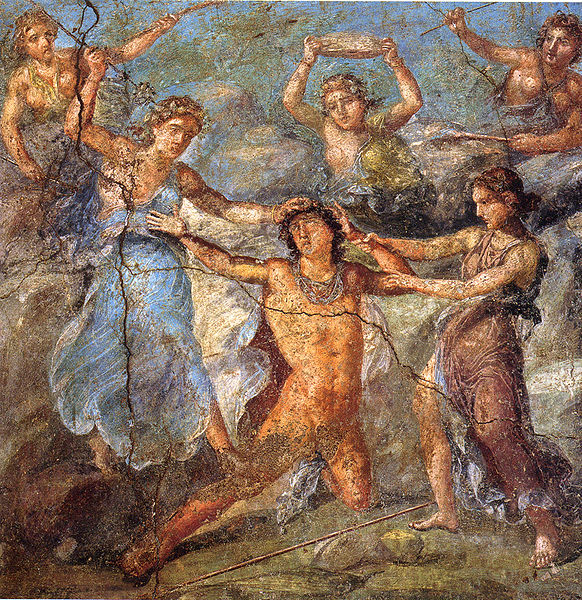A student in my Intro to Lit class who is suffering from cancer has caused me to rethink Euripides’ The Bacchae. His insights may also aid him as he copes with the disease.
Amos Kern-Perets (he is allowing me to use his name and talk about his illness) discovered that he had testicular cancer shortly before coming to St. Mary’s. The good news, Amos tells me, is that testicular cancer, which once was fatal, now has a 95% cure rate. Still, the semester is proving arduous as Amos undergoes chemotherapy. He has had to miss most of our classes so far although he maintains contact with me via e-mail and he has been discussing our readings with his mother, who is a professor of political theology. That partly explains why his journal entry on The Bacchae was superb.
But I suspect his insights also owe something to his condition. To explain, I must first elaborate on conventional interpretations of the play.
When I teach The Bacchae, I generally emphasize that Pentheus, who defies Dionysus and is therefore torn apart by Dionysus-crazed women (including his mother and aunts), is responsible for his own fate. This reading has the advantage of bolstering good psychological, and for the matter ecological, lessons: if we work with and respect nature (either our own internal nature or the nature around us), then nature will prove benign, whereas if we seek to dominate, nature will bite back. From an environmental point of view, we can apply this lesson to global warming, habitat destruction, fire suppression, building on flood plains, and a many other situations. From a psychological point of view, we can watch how we balance the competing claims of superego and id, which has relevance for issues such as sex education, homophobia, childrearing, and the like.
Viewed through such a lens, literature functions as a social warning system, alerting us to when we have strayed into unhealthy territory. By the same reasoning, poets are society’s shamans, sensing our discord and creating narratives that articulate our problem and point to solutions.
Thus, Euripides in 408 BCE could have chosen to take the commonly known myth of Pentheus and Dionysus and turned it into a contemporary play because he was concerned that (I’m speculating here)
–the worship of the gods in Athens had become too formal and cerebral;
–Athenian society was emphasizing philosophy at the expense of feeling;
–following its military defeats in the Peloponnesian War, Athenian society became socially reactionary and tried to assert control where it could (i.e., over its women and sexual mores).
Along the same lines, I argue that a related drama was occurring in America in the late 1960s, which is why The Bacchae struck a chord with young people then: it captured how they were challenging the sexual repression of the 1950s. And as I argued last week, the play can speak to us strongly now as America’s right wing, fearful of major demographic changes that have resulted in (among other things) a black president, seeks control over female reproduction—something which happens not infrequently in societies reacting to significant social change (for instance, the Taliban in Afghanistan after the Soviet invasion, the mullahs in Iran after the overthrow of the Shah).
Okay, all well and good. But interpreting The Bacchae as a social barometer wasn’t enough for Amos, even though he understood my approach. What bothered him was how excessive the punishment was for Pentheus and his mother Agave. Amos essentially argues that Dionysus proves to be wilder, more savage, and more unpredictable than my theory allows for.
Amos’s perspective made me go back and examine my liberal assumptions. Liberals tend to be more optimistic about nature (including human nature), thinking that there are ways to handle it. Conservatives, by contrast (I’m thinking of people like Jonathan Swift, Samuel Johnson, and for that matter Sigmund Freud) warn that nature is far more resistant to human control than we like to think. Perhaps, I mused aloud in my discussion with Amos, paying proper obeisance to Dionysus is like making sacrifices to Poseidon before going on a sea voyage—it gives us a comforting illusion that we have some control whereas we don’t really. When Cadmus blames Pentheus for having disrespected Dionysus, maybe it’s because casting blame is a way of assuring ourselves that we indeed have control: if only we had arranged matters differently, we might have come out all right. Whereas perhaps the reality is that we have no control, or less control than we thought.
And this applies to Amos’ cancer. Here was a young man’s body turning on itself for no reason that anyone can determine. Perhaps some Cadmus might find something in Amos’s behavior or environment to account for the cancer, but it’s also possible that this is nature attacking an innocent young man for no reason.
Therefore Amos interprets The Bacchae as an unruly god who cannot be placated. There’s plenty in the play to support that position, and there’s a kind of comfort to be gained from a narrative which confirms our sense that life can be unfair.
Dionysus is not a tame god.


